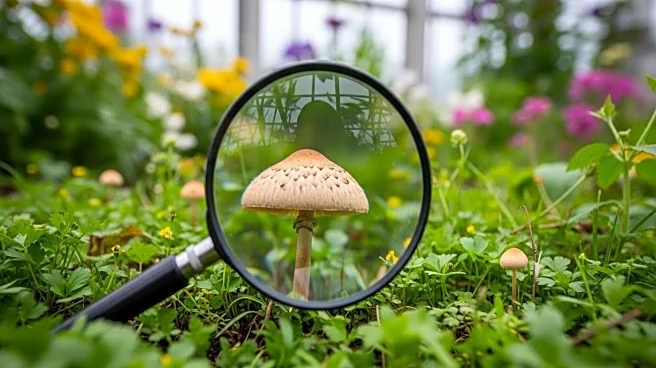What is the story about?
What's Happening?
Kew Gardens, in collaboration with the UK government and other partners, is spearheading a significant initiative to enhance the understanding of fungi. This project involves sequencing the DNA of fungi species stored in the Kew Fungarium, one of the largest fungal collections globally. The aim is to uncover the vast diversity of fungi and their potential to address major global issues such as food insecurity and plastic pollution. Researchers are exploring the genetic makeup of fungi to identify species capable of digesting plastics and producing medically beneficial compounds. This effort is part of a broader mission to leverage fungi for sustainable solutions to pressing environmental and health challenges.
Why It's Important?
The research conducted by Kew Gardens is crucial in the quest for sustainable solutions to global problems. Fungi play a vital role in ecosystems, and understanding their capabilities can lead to breakthroughs in combating plastic pollution and enhancing food security. The potential medical applications of fungi are significant, with the possibility of discovering new drugs that could save lives. This initiative not only contributes to scientific knowledge but also supports efforts to mitigate the impacts of climate change and improve agricultural productivity. The findings could benefit industries, healthcare, and environmental conservation efforts worldwide.
What's Next?
The ongoing research at Kew Gardens is expected to continue yielding insights into the genetic properties of fungi. As more fungal genomes are sequenced, researchers anticipate discovering additional species with the ability to digest plastics and produce beneficial compounds. The collaboration with international partners will likely expand, fostering further advancements in fungal science. Stakeholders in agriculture, healthcare, and environmental conservation may increasingly look to fungi-based solutions as viable options for addressing global challenges. Continued support and funding will be essential to sustain and expand these research efforts.
Beyond the Headlines
The implications of Kew Gardens' research extend beyond immediate scientific discoveries. The ethical and cultural dimensions of utilizing fungi for environmental and health solutions are significant. As society grapples with the consequences of climate change and pollution, fungi offer a natural, sustainable alternative to synthetic solutions. The integration of fungi-based technologies into various sectors could lead to long-term shifts in how industries approach sustainability. Additionally, the cultural appreciation of fungi and their role in ecosystems may grow, influencing public attitudes towards conservation and biodiversity.














